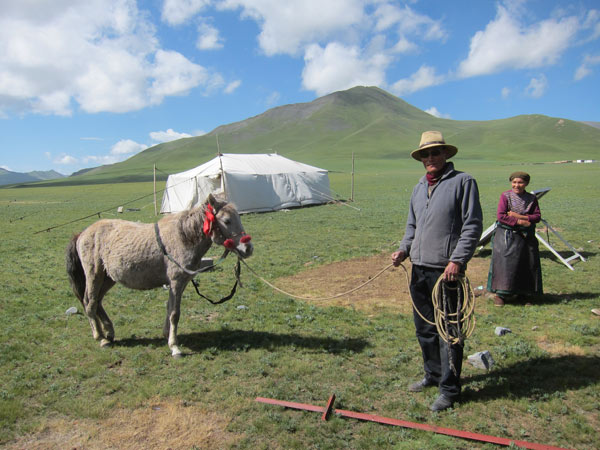Qinghai winning fight against major disease


Incidence of echinococcosis, a major infectious disease in Qinghai province, has been halved over the past seven years due to intensified prevention and treatment efforts, according to the provincial health authority.
Echinococcosis in humans is caused by contact with animals, such as dogs and foxes, that are infected with a type of tiny tapeworm. It can cause serious damage to major organs such as the liver, lungs and brain, and is potentially fatal.
Qinghai has regarded the fight against echinococcosis as a priority in recent years, with special efforts and resources directed to eliminate the disease and reduce poverty caused by it, Li Xiuzhong, deputy director of Qinghai Provincial Health Commission, said at a news conference on Monday.
As a result, the incidence of the disease in the province has been reduced to 0.3 percent, from 0.63 percent in 2012, and its prevalence has generally been under control, he said.
The disease is rare in most parts of China but is more commonly seen in several regions where a larger number of herders live, including Qinghai. Due to herders' traditional living habits, such as living in close quarters with their animals, it is easier for them to become infected. It is also a major cause of poverty for patients in the province because they are too sick to work, Li said.
In addition to prevention efforts, such as expelling parasites in dogs and offering health education to herders, the provincial health authority has intensified testing, diagnosis and treatment for patients with the disease in recent years, he said.
Since 2012, Qinghai health authorities have tested about 5 million people and confirmed 17,000 patients with the disease. About 2,300 of them received surgeries, and the rest were provided with free medication, he said.
To provide effective treatment, and to reduce their medical bills so they do not fall into poverty due to treatment, the province has established green channels for patients with the disease so they can get timely care at designated hospitals, Li said.
Meanwhile, patients that live below the poverty line in the province can get 90 percent of their medical bills reimbursed through the provincial health insurance fund, while patients above the poverty line can receive an 80 percent reimbursement.
In August, the Chinese Medical Doctor Association launched a campaign to fight echinococcosis in China, focusing on areas more prone to the disease including Qinghai and the Tibet autonomous region.
The association aims to eliminate the disease in China by 2030 through a wide range of efforts, including conducting research and development on the diagnosis and treatment of the disease, providing training to doctors and nurses at the grassroots level, and organizing voluntary medical services for patients.
- Doctor injects child with improperly stored drug at Chongqing hospital
- Xi's special envoy attends forum dedicated to Intl Year of Peace and Trust in Turkmenistan
- Memorial ceremony remembers victims of Nanjing Massacre
- Louvre's largest showcase in China goes on display at Museum of Art Pudong in Shanghai
- Indonesian foundation to fund students, school administrators to exchange and study in Tianjin
- Archives detailing crimes of Japanese unit released




































